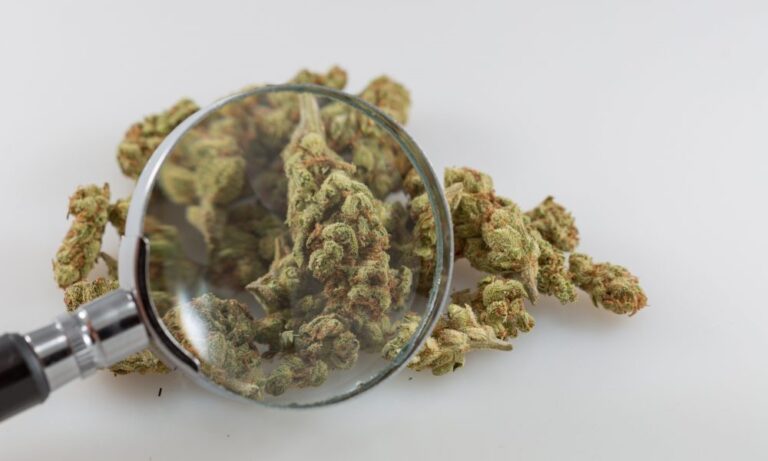“There is an economic incentive to exaggerate efficacy and ignore adulterants.”
Beacon by Suzanne King
This article was originally published by Beacon, an online news outlet focused on in-depth local journalism in the public interest.
Missouri will spend millions of dollars from state cannabis taxes on a laboratory to help regulators monitor the safety and potency of joints, edibles and other cannabis products that are sold annually across the state for more than $1 billion. It's a plan.
Health experts and consumer groups praised the added regulatory checks outlined in an Oct. 11 report on Missouri's cannabis industry. Twelve other states already have quality assurance laboratories known as reference laboratories.
“We don't just want to focus on following the rules,” said Amy Moore, director of the Missouri Department of Cannabis Regulation. “I want to see the results as well.”
Moore said the new reference laboratory, which will operate out of the Missouri State Public Health Laboratory in Jefferson City, is expected to be fully operational by fall 2025. The state allocated $3.8 million for the institute in fiscal year 2024 and $2.4 million in fiscal year 2025. .
Testing includes determining levels of cannabinoids, including the psychoactive compound THC, and looking for contaminants such as pesticides, heavy metals, mold, and other pathogens.
Missouri, which legalized medical marijuana in 2018 and recreational marijuana in 2022, has licensed 10 private labs in the state to test cannabis products before they are packaged for sale. But these lab tests are paid for by the companies that manufacture and sell the products.
Observers said a new state-run institute would help address those conflicts of interest.
“There is a temptation on the part of (private) laboratories to provide the results that their customers want,” said the Columbia lawyer who chairs the national board of NORML, an advocacy group that has long sought to legalize marijuana and marijuana. says Dan Viets. We aim to represent consumers in the growing legal market. “There is an economic incentive to exaggerate efficacy and ignore adulterants.”
Mislabeling also raises serious health concerns, especially when a product is advertised as less potent than it actually is.
“Overdose is a possibility,” says John Foxworth, a professor of pharmacology at the University of Missouri-Kansas City School of Medicine. “You might get into a traffic accident. You might fall.”
The Centers for Disease Control and Prevention (CDC) warns that serious health conditions such as cannabis use disorder are on the rise. This drug may have negative effects on the brain, heart, and other body functions.
Foxworth said the wide variety of cannabis products on the market in many different forms makes it difficult for any lab to perform an accurate test. Buyers should be careful, he said.
“These new marijuana products are actually quite potent,” Foxworth said.
In fact, the Missouri constitutional amendment that legalized marijuana for Missourians over 21 prohibits the state from imposing potency restrictions. But even if it's a concern for health experts, it doesn't mean it's suppressing sales.
Jack Cardetti, a spokesman for the Missouri Cannabis Trade Association, which represents cannabis retailers, growers and manufacturers, said Missouri's sales for the first half of 2024 are higher than the four other states where recreational cannabis is legal. He said it exceeded all states. This includes neighboring Colorado.
“Missouri was in a great situation,” Cardetti said. “Our medical cannabis market was strong.”
He said businesses were ready when recreational sales became legal. And the state acted quickly to convert medical licenses to “blanket” licenses, adding the right to conduct recreational sales.
Since the end of 2020, the state's retail sales have exceeded $3 billion, with $1.98 billion coming from the recreational sector and $1.04 billion from the medical sector.
Overall, the legalization of recreational sales meant a significant drop in revenue from medical cannabis sales, falling to $136 million in 2024 from $302 million the previous year. Taxes on drug sales also fell, but they were offset by entertainment tax collections.
The state imposes a 4 percent tax on pharmaceutical sales and a 6 percent tax on recreational sales.
Medical marijuana revenue deposited with the state in fiscal year 2024 was about $6.3 million, down from $26 million the previous year, according to the Missouri Department of Health and Senior Services' annual report. The state's revenue from recreational marijuana in fiscal year 2024 was $30 million, compared to $22 million the previous year.
Regulating a relatively new industry alone will consume $32 million.
The medical tax windfall goes to the Missouri Veterans Affairs Commission to support veterans' homes and other approved services. In fiscal year 2024, $13 million from tax dollars went into the veterans fund.
The recreation tax is designated to cover the cost of vacating marijuana convictions by the government. The remaining funds will go to the Veterans Affairs Commission, grants for drug addiction treatment and prevention programs, and the public defender system for legal assistance for low-income Missourians. In fiscal year 2024, $1.3 million was allocated to each program.
This article first appeared in Beacon: Kansas City and is republished here under a Creative Commons license.
Missouri regulators deny certification of most marijuana social capital microbusiness license winners
Marijuana Moment is made possible by support from our readers. If you rely on our cannabis advocacy journalism to stay informed, please consider a monthly Patreon pledge.

